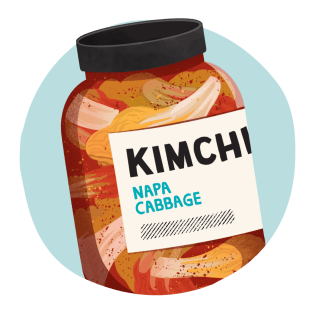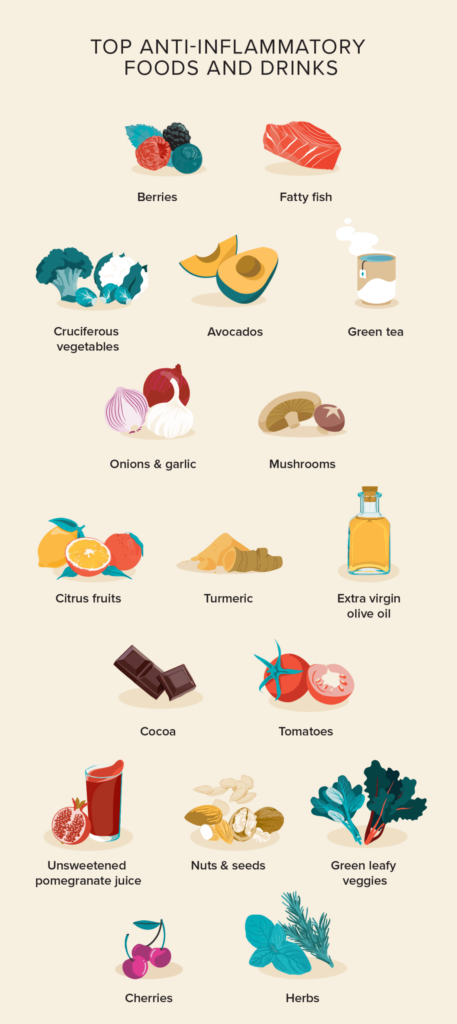Foods With Anti-Inflammatory Properties
The new product is a great addition to our lineup.
Our latest product is an exciting addition to our already impressive lineup! With its innovative features and cutting-edge design, it's sure to be a hit with customers. Don't miss out on this amazing opportunity to upgrade your life!
Foods With Anti-Inflammatory Properties
Inflammation is a necessary immune system response that helps us to heal and protect the body from invaders. Uncontrolled and chronic inflammation, however, can lead to a wide range of diseases in the body and can have lasting damage. Fortunately, there are certain foods with anti-inflammatory properties that can help control inflammation and attendant pain and aches in the body. Here are some of the most powerful anti-inflammatory foods.
Omega 3 Fatty Acids
Omega-3 fatty acids are extremely beneficial for reducing inflammation, particularly when sourced from fish oil. Omega-3 fatty acids are said to reduce the production of inflammatory substances in the body, specifically eicosanoids and leukotrienes. The two main forms of omega-3 fatty acids are eicosapentaenoic acid (EPA) and docosahexaenoic (DHA). Fish such as mackerel, tuna, salmon, and herring are rich sources of EPA and DHA. Additionally, flax seeds, flaxseed oil, chia seeds, walnuts, and krill oil are some of the plant-based sources of these fatty acids.
Berries
Berries are loaded with antioxidants and are known to fight cellular damage by free radicals. The unique combination of antioxidants, specifically anthocyanin, polyphenol, and Vitamin C content, makes berries powerful anti-inflammatory agents and immune boosters. Raspberries, blackberries, blueberries, and strawberries are great sources of antioxidants that can combat inflammation in the body.
Leafy Greens
Leafy greens are perhaps the healthiest of all the foods that contain anti-inflammatory properties. Leafy greens, such as kale, spinach, mustard greens, collard greens, swiss chard, bok choy, and romaine lettuce are packed with vitamins, minerals, antioxidants, and fiber. The polyphenol antioxidants and fiber, found specifically in spinach and kale, are known to reduce systemic inflammation in the body.
Cruciferous Vegetables
Vegetables such as broccoli, cauliflower, cabbage, Brussels sprouts, and kohlrabi are packed with antioxidants and anti-inflammatory compounds. Cruciferous vegetables are known to be rich in glucosinolates. A compound that is found in these vegetables called isothiocyanates is believed to be beneficial for fighting inflammation and reducing the risk of diseases such as cancer, diabetes, and heart disease.
Garlic
Garlic has been used for centuries for medicinal purposes, and its impressive list of health benefits includes its ability to fight inflammation. Allicin, the active compound in garlic, helps to block the production of inflammatory molecules, thus reducing inflammation in the body. Garlic is also high in Vitamin C, which may help to reduce inflammation as well.
Avocados
Avocado is an excellent source of healthy monounsaturated fats, which are beneficial for reducing inflammation. Avocados are also rich in Vitamin E and other antioxidants, which help to combat inflammation in the body. Additionally, avocados are high in fiber, which may help to reduce systemic inflammation.
Tomatoes
Tomatoes are well-known for their anti-inflammatory. The active compound found in tomatoes is called lycopene, which is responsible for its antioxidant and anti-inflammatory properties. Many studies have also linked tomatoes to the prevention of certain types of cancer due to its ability to prevent cellular damage, which is caused by inflammation.
Fermented Foods
Fermented foods are increasingly gaining in popularity due to their ability to benefit the human microbiome and protect against chronic diseases. Fermented foods contain probiotics, which are beneficial bacteria that help to fight inflammation in the body. Foods such as kimchi, sauerkraut, kombucha, miso, and tempeh are all packed with beneficial bacteria that can help to reduce inflammation and improve digestive health.
Olive Oil
Olive oil is often touted as a superfood due to its heart-protective effects and its ability to lower cholesterol levels. What many people don’t know is that olive oil is also effective at reducing inflammation in the body. Olive oil is rich in monounsaturated fatty acids, which are known to reduce inflammation in the body. Additionally, olive oil contains antioxidants and anti-inflammatory compounds such as polyphenols and oleocanthal.
Spices
Spices such as turmeric, cinnamon, cumin, ginger, and garlic are known to have powerful anti-inflammatory properties. These spices are rich in antioxidants, which reduce inflammation in the body. In particular, curcumin, which is found in turmeric, is known to have particularly powerful anti-inflammatory effects.
Summary
Inflammation is a necessary response in order to heal and protect the body from invaders. However, prolonged inflammation can lead to a variety of health issues. Fortunately, there are some foods with anti-inflammatory properties that can help to reduce inflammation in the body. Omega-3 fatty acids, berries, leafy greens, cruciferous vegetables, garlic, avocados, tomatoes, fermented foods, olive oil, and spices are some of the most powerful anti-inflammatory foods. Eating a diet rich in these foods can help to reduce systemic inflammation in the body, thus improving overall health and wellbeing.
If you had a dime for every time you heard the word “inflammation” …
You’re probably all too familiar with the concept, and the pain that comes with it, if you have psoriatic arthritis. But what can you do about it?
Fortunately, lots. There are loads of powerful, science-backed actions you can take every day to reduce inflammation, ease your symptoms, and improve your overall health.
Let’s start with food (because, yum, food). After this lesson, you’ll have a list of go-to anti-inflammatory foods and some new ideas for incorporating them into your repertoire.
Does eating anti-inflammatory really help?
If you’re wondering whether filling up on anti-inflammatory foods can really, truly help your psoriatic arthritis, the answer is yes — in a few ways.
First, we know that anti-inflammatory eating helps reduce inflammation in general. That’s a very good thing if you have psoriatic arthritis because higher levels of inflammation are linked to having more frequent and severe flares.
Anti-inflammatory compounds shown to be especially powerful include:
- omega-3 fatty acids, like in salmon
- polyphenols, like in olive oil, tea, and berries
- carotenoids, like in carrots and other bright red, orange, and yellow vegetables
(More on these in a bit.)
Other things we know about eating a plant-rich, whole-foods diet (chock full of anti-inflammatory foods):
- It’s associated with healthy levels of body fat. And we know that overweight and obesity are linked with having more psoriatic arthritis symptoms along with making certain treatments less effective.
- It helps prevent (or manage) other inflammatory conditions like heart disease and diabetes, both of which are more likely to happen in people with psoriatic arthritis.
The science is still emerging on how an anti-inflammatory diet may directly affect psoriatic arthritis symptoms, but early evidence is compelling.
In one 2021 case study, a woman taking methotrexate for her psoriatic arthritis symptoms adopted a strict, whole-foods, plant-based diet. Her symptoms completely subsided and she was able to go off her medication.
Not everyone would have the same results, but it shows just how powerful dietary changes can be.
You can likely make meaningful improvements to your everyday life with psoriatic arthritis by tweaking the foods you eat.
Eating anti-inflammatory can be cheap and simple
Ten years ago, food was described as “healthy” or maybe “rich in vitamins.” But you’d never have heard someone call a food “anti-inflammatory.” That term would be reserved for things like Advil.
Today, though, you can find a slew of superfood powders, bars, or other pricey products marketed as anti-inflammatory.
But don’t let the hype fool you. Many of the foods highest in anti-inflammatory compounds are inexpensive and easy to find.
Just head to your local grocery store, farmers market, or maybe your own garden. Mother Nature provides a cornucopia of delicious anti-inflammatory foods.
And if you’re eating on a tight budget, there are plenty of affordable fresh, dried, canned, and frozen foods that pack an anti-inflammatory punch. (Stay tuned, a reveal of the most potent foods and tips on incorporating them into your day-to-day are just ahead.)
What makes a food anti-inflammatory?
The short answer: Anti-inflammatory foods contain a variety of natural compounds that work in different ways to ward off or douse chronic inflammation in the body.

Many anti-inflammatory foods are high in antioxidants — a powerful type of anti-inflammatory compound. You’ve probably heard a thousand times that blueberries are high in antioxidants, right?
Foods that are high in antioxidants do some heavy lifting when it comes to your health.
Your own body produces free radicals naturally all the time (cue spooky music: “The call is coming from inside the house!”)
They’re a by-product of typical cellular function.
But you can have higher levels of these harmful molecules due to your diet, smoking, and other factors around you, like pollution.
That’s why you’re constantly being told to eat plenty of antioxidant-rich foods — think richly colored fruits and veggies.
COOL SCIENCE
When you’re not consuming antioxidant-rich foods … research shows that fasting could be a safe and effective way to reduce psoriatic arthritis disease activity and alleviate symptoms. Wait, what?
Before you say “no way,” know that fasting doesn’t necessarily mean eating less. That’s because fasting typically limits when you eat, but not what you eat, and the fasting period can be relatively short.
In the 16/8 method of intermittent fasting, for instance, you limit your eating to 8 hours every day. And a lot of the fasting period you spend sleeping. Sound maybe doable?
Intermittent fasting isn’t for everyone, though. Before trying it, talk with your healthcare professional.
What’s your gut (microbiome) got to do with it?
Some evidence suggests that keeping your gut happy may help improve your psoriatic arthritis.
It turns out, people with psoriatic arthritis are more likely to have a decreased diversity of gut bacteria and a condition called dysbiosis. This basically means that you have fewer of the “good” bacterial species normally found in healthy gut microbiomes and more of the “bad” ones.
In related news, studies also show that people with psoriatic arthritis are at a higher risk of developing inflammatory bowel disease (IBD).

But having a healthy microbe community in your gut can keep inflammation at bay and produce nutrients your body needs.
You read that right — your gut bacteria literally feed you. For example, they produce short-chain fatty acids, anti-inflammatory compounds that nourish the cells in your colon.
Let’s look at what you can do to boost that ’biome.
How to boost your microbiome
Some good gut news: Eating lots of nutritious, anti-inflammatory foods can help increase your bacterial diversity, support better digestion and decrease intestinal inflammation.

Plus, it can help you maintain a healthy percentage of body fat.
Focus on fiber, too, because FYI, foods high in fiber are gut-boosting all-stars.
That’s because dietary fiber nourishes beneficial gut bacteria. Fermented and probiotic foods, like sauerkraut, kimchi, yogurt, and kefir, are anti-inflammatory and gut good guys, too.
Bring on the (beneficial) bacteria!
PRO TIP
If you haven’t yet, consider trying out some Mediterranean-style recipes.
The Mediterranean diet is rich in anti-inflammatory compounds thanks to its emphasis on veggies, olive oil, fruits, and fish. Plus, it’s low in foods that tend to create inflammation, like fast food and processed meats.
Some studies show that people with psoriatic arthritis who stick to a Mediterranean-style diet tend to have lower disease activity compared with people who don’t. Club “Med” anyone?
Here’s a cheat sheet of some of the most powerful (and easy to find) anti-inflammatory foods and drinks.
This crop of recommendations was hand-picked by our dietitians and is based on peer-reviewed research.

COOL SCIENCE
Olive oil can boost your body’s ability to absorb the antioxidants in foods like leafy greens, onions, tomatoes, and more. Easy peasy olive squeezy: Add a drizzle of extra virgin olive oil to your veggies tonight.
Inflammation-fighting diet tips
Here are some tips we love:

- Enjoy a cup of tea: Swap your soda for a cup of unsweetened green tea.
- Or coffee: It’s rich in anti-inflammatory compounds. Decaf, too.
- Boost with berries: Toss fresh or frozen berries like blackberries, blueberries, and strawberries into oatmeal, smoothies, or yogurt, or eat them on their own.
- Make your carbs count: Choose nutrient-dense, high fiber carbs like beans, sweet potatoes, and healthy grains like quinoa. Your gut bacteria will love you for it.
- Purchase pre-prepared veg: Opt for pre-chopped and prepped fresh or frozen vegetables to up your intake. No slicing or dicing required.
- Have the side salad: Add a salad to your lunch or dinner when you’re out at restaurants or eating at home.
- Go nuts: Snack on homemade trail mix made with a mix of nuts and seeds. If you miss the chocolate candies, toss in a handful of dark chocolate mini morsels
- Season well: Add fresh or dried herbs and spices to homemade or prepared soups, stir-fries, and grain dishes.
- Sip on seltzer with a splash of antioxidants: Add a splash of pomegranate or tart cherry juice to seltzer for a bit of flavor that doesn’t add much sugar.
- Add canned salmon or tuna: Salmon and tuna make an easy meal or snack, whether on whole grain crackers, or a salad. They’re also a good way to get more seafood in your diet.
- Drink your antioxidants in a smoothie: Why not drink your anti-inflammatory foods? You can tailor the ingredients to your taste and nutrition needs. Stock up on pre-chopped and frozen items that you can just toss in, good if you’re experiencing a flare or are short on time. (Or both.)
One comment
Leave a Reply
Popular Articles





So useful! #healthyliving
niceforu: Let’s try out some of these recipes!
#healthyeating